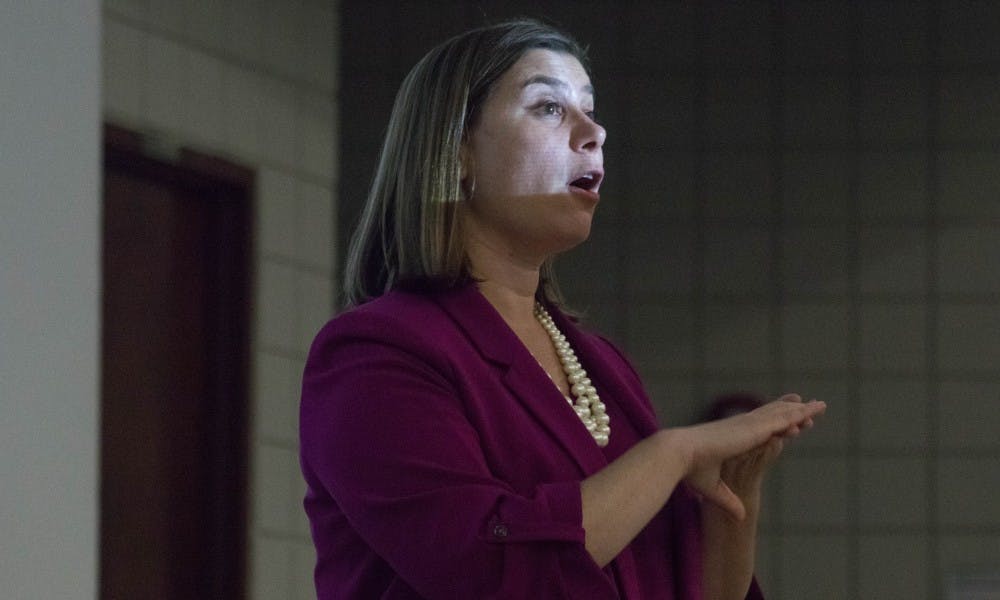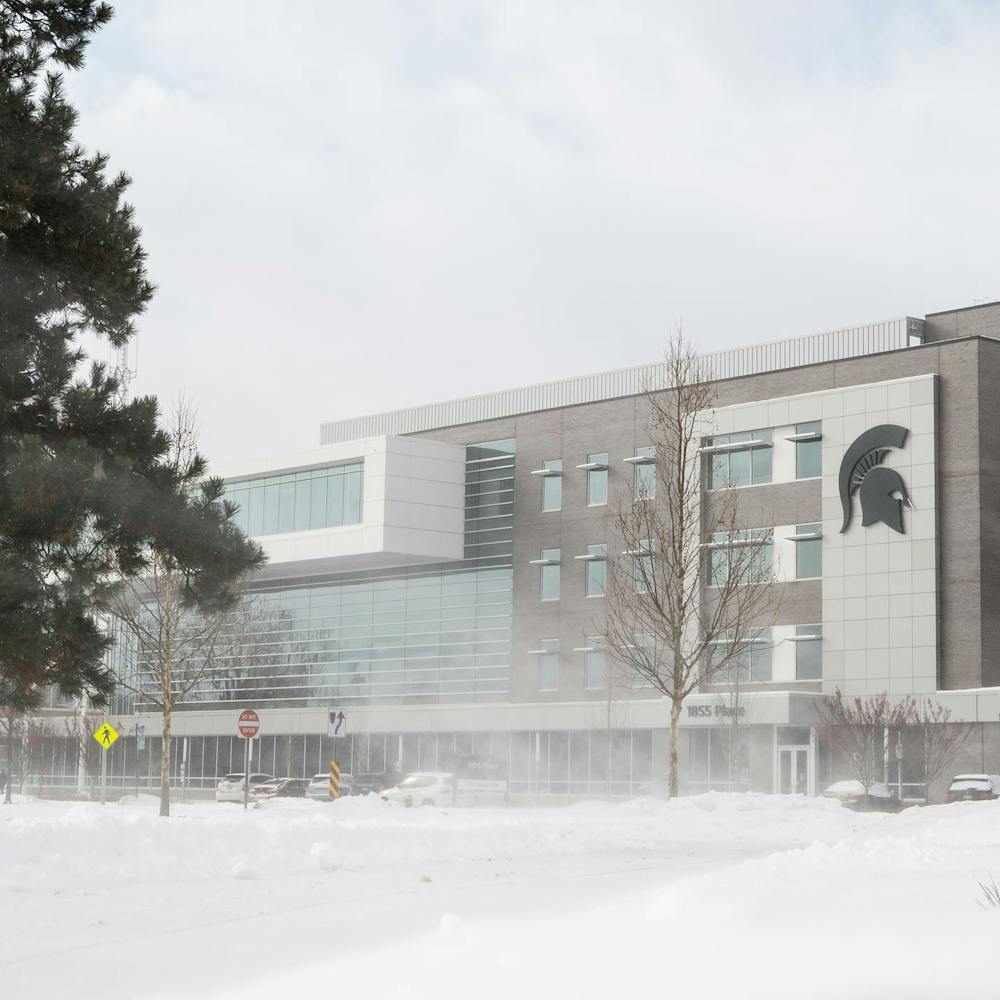Rep. Elissa Slotkin (MI-8) is working with her Senate counterparts Michigan Sens. Gary Peters and Debbie Stabenow to push a second coronavirus relief package — this time giving adult dependents cash as well.
The latest on coronavirus aid from U.S. Rep. Slotkin

U.S. Rep. Elissa Slotkin speaks to the MSU College Democrats at Wells Hall on Sept. 18, 2018.
Q:Can you give a rundown of what exactly this is you're working on?
A: Sure. So almost immediately after we passed the CARES act less than two weeks ago — that was $2.2 trillion, the largest
single economic recovery package in American history. We started realizing that there were some gaps in the legislation, and I think that's probably bound to happen when you move $2.2 trillion through the legislative process and in a very short period of time.
But the problem that we immediately heard about, especially from our Michigan State students, was that the legislation that
passed allowed for American citizens who file taxes to receive, who make under $75,000 a year to receive a $1,200 direct payment. And if you have dependent children under 18, you got an extra $500 per child.
But what immediately became apparent was that if ... that dependent is a college student who's over 18, the parents didn't get the extra $500 and the student didn't get the $1,200 check because they were still claimed as a dependent.
So, we had this gap for people who were claimed as dependents but were over 18. This became apparent immediately, especially to people like me who represent a number of universities. But of course, the big one being Michigan State. We started getting calls into our office, e-mails into our office. And for that reason, myself and now 86 other members of Congress have co-sponsored the All Dependent Children Count Act.
It was introduced by US Rep. Angie Craig from Minnesota. It's a bipartisan group of 86 members that would ensure that families receive payments for all dependents, not just those that are under 18, and we are hoping to get that into the next emergency appropriation, which we are already starting to talk about now in Congress.
Q: Do you think it's going to pass?
A: You know, we obviously moved really quickly and having a bipartisan group of sign on is always really important, because of course,
negotiations because Democrats run the House, and Republicans run the Senate, and then (we have) a Republican administration. It's really important to us that this legislation be bipartisan, which is. That gives us a better leg up.
But the truth is, a lot of these negotiations, especially with social distancing, are happening across the airwaves and across video conference and telephone lines. So, I don't want to make promises that I can't keep. But the good news is we have a really strong push from a bipartisan group of members.
Q:What caused this gap? Why is it that dependents aren't getting anything?
A: I mean, honestly, it came as a surprise to most of us in Congress, because I think whenever you're crafting a really large bill
like this ... on such a tight timeline, you're going to find that the legislation is not perfect and it has second order effects that you didn't intend. And I think that's exactly why we have this gap that was obvious as soon as the ink was dry.
READ MORE
But no one had, I believe, intended it that way. So, you know, we're trying to close the gap in this next bill and make sure that Michigan families can weather this pandemic as best as possible, as well as possible. I just don't think it was intentional by anybody.
I think that, for the drafters, they were thinking of dependents as people who were under 18. But the truth is, that's not how our tax system works. There are dependents who are in their early 20s, and they deserve compensation as well as folks who are, you know, under 18.
Q:What else would you like to see regarding COVID-19 relief?
A: We need our small businesses to have the best fighting shot they can get to weather this really deeply, destructive period
that we have right now. We also want to see, obviously things like money for food assistance so that we don't have anyone going hungry during this time.
But, we have to deal with the medical situation first and foremost. And so if we determine that we still need money for testing and personal protective equipment, those are going to be the things that help us get over the hurdle on the medical side so that we can reopen our economy, reopen our universities and get back to life in the new normal.
Q:How will the process work? How will this get passed?
Support student media! Please consider donating to The State News and help fund the future of journalism.
A: So, basically what happens is right now we're in the process of drafting an early draft of what we're calling CARES 2.0. You
know, the next version of the CARES Act, which was the $2.2 trillion. And the way this works is you find an issue that you care about and you rally as many of your fellow congressmen and women — senators even — to advocate on behalf of that issue.
You show real intent and passion about an issue by showing how many members you get on your side. So, that's why it's really positive, again, that it's 86 members and it's bipartisan because that's a really strong signal to Speaker Pelosi, to Majority Leader McConnell, to the White House and Steve Mnuchin that this is something people care about across the country.
And then you quite literally lobby to push and keep that language in there. And you're on the phones, pressing committee chairs to get them on board. You're calling the Speaker's office. You're calling your senators, making sure they're fighting for this.
I work with my Republican colleagues to make sure they're advocating this with the administration and the White House. It is the strongest way possible. So, you just start working the phones, burning up your cell phone battery and having video teleconferences to push, push, push for this legislative fix to appear in the specific language in this bill to appear in the next round of the CARES Act.
Q: Is this a separate bill or an amendment to the previous CARES act?
A: We drafted a separate bill just to get the language out in circulation. But what we're hoping is that the direct language
from this bill is adopted into the next round of the CARES Act. So, we don't need to pass this separately.
We put it on the table so that everyone knows our intention, so that everyone has the exact language that we want to see in the next CARES Act. So, if we do our job and we're successful, you will see the exact wording from our piece of legislation today incorporated in full into the CARES Act.
Q: Is there anything else in this bill college students should know about?
A: They are eligible for unemployment. So, we know a lot of university students are part-time employees. Sometimes they're self-employed folks to do contract work on the side. Whatever your work was before COVID-19, it should now be eligible for some sort of unemployment compensation.
So, you know, before the CARES Act, if you were an Uber driver, you did not qualify for unemployment. Now that Uber driver can claim and get money from the unemployment agency. I really urge every student who had a job that they are not being paid at anymore to go and apply for unemployment insurance.
We were able to get not only the categories of people who are eligible broadened, but we were able to get more money per unemployment check. Depending on how many hours you were working and at what job, at what compensation rate, some people are going to see an extra $600 per unemployment check. That's a lot more money than the average check, which if you work minimum wage, it tends to be under $400 per check.
I really encourage all students who may not have thought before COVID-19 about applying for unemployment insurance to go ahead and apply through the Michigan unemployment agency. The website has been problematic because it's been overloaded. Apply at odd hours — off-peak hours — so that you get in there and you can submit your application. But college students should be applying along with everybody else.
Q: How is work being done there? Are you in Washington, D.C right now?
A: No, I'm in Holly, Michigan. I'm at home at my family farm at great grandfather's desk. Pretty much most members of Congress
are at home right now because of social distancing.
We're doing committee briefings, via phone and via video. We have a conference call today at 1:00 o'clock with all members of Congress and the vice president — Vice President Pence — for him to give us a briefing on how he sees work on COVID-19. We are doing almost everything remotely with the exception of voting.
And for the CARES Act, many of us got ourselves to Washington, D.C. and we got on the floor of the House. We stayed away from each other. We sat at least six seats apart from each other. I myself sat in the gallery and voted from the seats in the rafters, just so we could all be socially distant. And we will do that again and vote again in person when the next version of the CARES Act comes up. But in the meantime, committee work, oversight work is happening, but it's happening remotely.
Q: Is there anything you want to say to college students?
A: So, I think what we are experiencing right now is a generational event. And when I was in my early 20s, 9/11 took place. I was in
New York City. And a generational event means, you know, something that, you know, everyone in America experiences. We all remember who we were with and what we were doing when COVID-19 came into our lives.
And because it's a generational event, it requires just a very different approach from our communities, from leaders. And it means we will be different after we get rid of this virus. You know, after 9/11, we had to suddenly take off our shoes at TSA and show an ID when we went the government building. We changed the way we thought of ourselves and the perception of threat really changed. And I expect the same thing with COVID-19.
Q: Right now, many people, including college students, are facing a mental health crisis from COVID-19. Are there any resources they should be aware of?
A: We’re starting to see lots of reports of people who are dealing with depression. Mental health issues are exacerbated when
people are socially isolated.
People have anxiety and they don't know what’s happening … I know that lots of folks who are social workers — psychologists — are taking patients and clients online and doing the sessions via video teleconference just to make sure that their services are available.
I know that just like every other industry, like our manufacturers are standing up to make gowns and mask, our social workers and our psychologists are stepping up to help the community right now.
Editor's Note: This interview took place on April 8.







